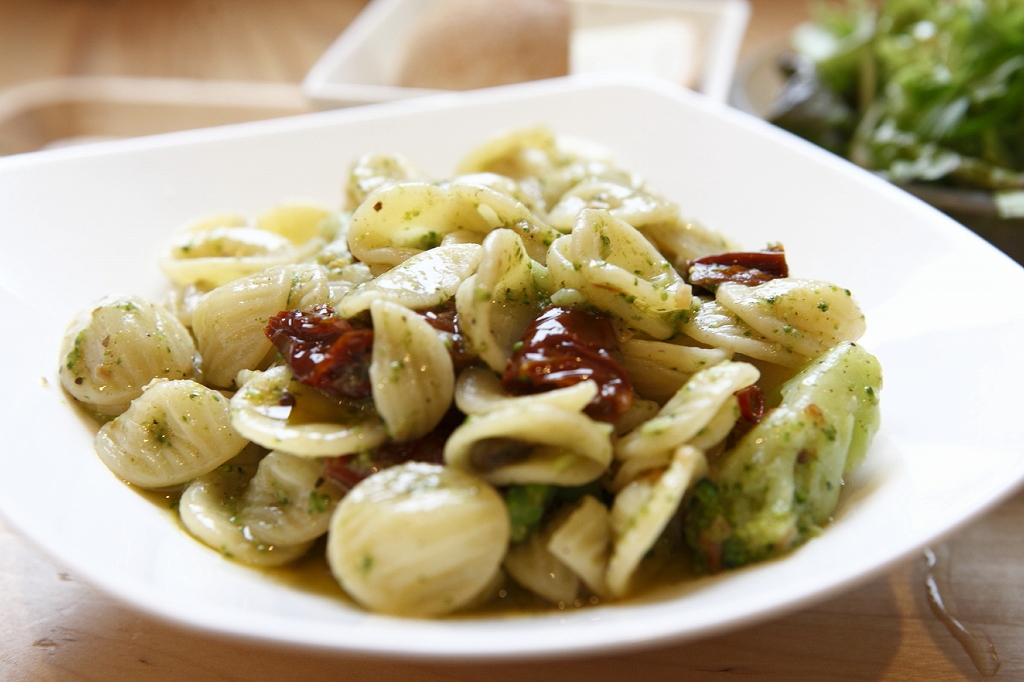
Lunch at Eki Café Ichinohashi

Lunch at Eki Café Ichinohashi
Ichinohashi District is an approximately 10-km drive east on the national road from the center of Shimokawa Town. The small community is surrounded by mountains and has a population of approximately 140 people. In the 1960s, when the forestry industry was thriving, the population exceeded 2,000. However, as the forestry industry declined, aging and depopulation advanced rapidly, and the rail line was discontinued.
Since 2001, people in district and town have held the Ichinohashi Revitalization Plan Review Board to discuss the future of the Ichinohashi District. Hirano Masanori of the Environmental Future City Promotion Section said, "We knew that if we did nothing, there was no hope, so we held discussions to determine what to do."
Shimokawa Town decided on the Ichinohashi Revitalization Plan in 2010, and the Ichinohashi Bio Village Concept mainly began with the rebuilding public housing more compactly.
Constructed in 2013-2014, the collective residential housing is one-story building, and wood biomass (wood chips for fuel) from Shimokawa is used to provide energy for heating and hot-water. Wood chips are produced from lumber wood waste and charcoal manufacturing.

The collective residential housing is occupied by 26 households

The wood biomass boiler supplies heat and hot water to facilities in the District

Wood chips for fuel

Hirano Masanori
Various "sprouts" have appeared in the Ichinohashi District.
One "sprout" is the cultivation of shiitake mushrooms since 2014. Approximately 230kg of shiitake mushrooms are shipped out every day. Temperature in the greenhouse is maintained at 22°C using wood biomass. Currently, 26 people are engaged in cultivation, and this has created greater employment in the District.

Greenhouse for shiitake mushroom cultivation
In the greenhouse next to the shiitake mushroom greenhouse, attempts to grow larch seedlings has begun. Imai Hiroshi, in charge of the experiments, said, "As a result of increased efficiency in the forestry industry, work such as gathering seeds and raising seedlings, has been outsourced. Seedlings planted in Shimokawa are from out of town. But for a truly sustainable forestry management, we have started to carry out experiments in order to develop a parent forest for seed collection, seedling cultivation and planting."

Imai Hiroshi

2-year-old seedling
Komatsu Sachiko and Yamada Kaori moved to the town three years ago as part of the Chiiki Okoshi Kyouryoku Tai (community revitalization volunteers), and grow pesticide-free herbs for use in cosmetics. After completed their service in the Kyouryoku Tai in April 2017, they established SORRY KOUBOU.

Ms. Komatsu transplants the seedlings one at a time to avoid damaging the roots
Eki Café Ichinohashi has greatly changed lunch in the Ichinohashi District. Managed by four members of Chiiki Okoshi Kyouryoku Tai, and has Miyauchi Shigeyuki from an Italian restaurant as its chef.
"As a child, my family often moved, so I never really had a hometown. The 3.11 earthquake occurred when I was working at a restaurant in Tokyo, and that led me to consider food safety."
Searching for a place to call his "hometown," and at the same time, a place "where good ingredients are available" as a cook, Mr. Miyauchi finally reached Hokkaido. He lived in Niseko for one year and then moved to Shimokawa. He plans to open an Italian restaurant in the Ichinohashi District when he completes his service at Kyouryoku Tai.

Miyauchi Shigeyuki

Eki Café Ichinohashi
SORRY KOUBOU
268 Ichinohashi, Shimokawa Town, Kamikawa-gun, Hokkaido
TEL・FAX:01655-6-2822
WebSite
Eki Café Ichinohashi
603-2 Ichinohashi, Shimokawa Town, Kamikawa-gun, Hokkaido
TEL:01655-6-7878